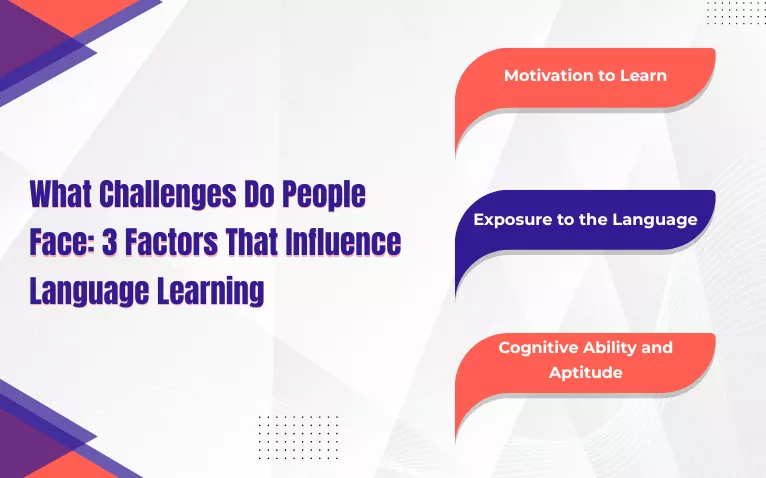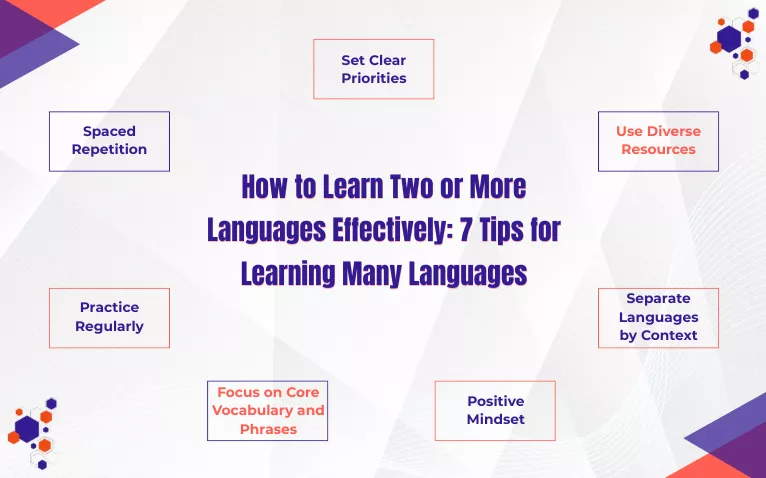So, imagine you are a bilingual Australian with NAATI certification. You are a translator. Someone just asked you how many languages can you learn at once? What will be your response? Well, your answer should technically be unlimited! But if you wish to give a solid reason for this, then this blog is for you!
Before we give you the reason, let us ask you a question: Which country has the highest number of living languages within its borders? Now, until you think, ask AI, or search for an answer, let us continue. We will disclose the answer later!
Table of Contents
ToggleHow Many Languages Can You Learn at Once (Realistically)?
Well, you can learn and speak as many languages as possible. However, realistically, you can learn 2-3 languages at the same time without confusion. Interestingly, 13% of the world’s population is trilingual. According to multiple sources, in 2021, about 5.8 million Australians (about 22.8% of Australia’s population) reported speaking a language other than English at home. This number has been increasing over the past few years.
Among the most spoken languages in the world, after English, in Australia, Mandarin (around 685,000 speakers), Arabic (367,000), Vietnamese (320,000), Cantonese (295,000), and Punjabi (239,000) are spoken.
Is It Okay to Learn Multiple Languages at Once?
Of course! It is absolutely okay to learn one or two languages or even five languages simultaneously. However, what matters is your goals, experience level, and the strategies you use. To speak more than two languages is not an achievement; speaking correctly is. Therefore, most translators, bilinguals, or hyperglots advise new learners to focus on one language at a time.
How Many Languages Should You Learn at Once?
Well, this entirely depends on you. Multiple factors influence a person’s language-learning journey. For instance, if you are willing to learn Chinese, which is also one of the Hardest Languages To Learn. Then you need to invest 1-3 hours daily to learn it quickly. However, if you do not have that much time to invest daily, then you must choose an easier language that is close to your native language family.
Now, before they start signing up for a language-learning course or downloading Duolingo, as a translator in the Language Translation Services industry, it is your duty to discuss the challenges they might face along the way!
What Challenges Do People Face: 3 Factors That Influence Language Learning

Motivation to Learn
People learn languages for multiple reasons. For some, it’s for a career; for some, it’s because they wish to binge-watch a new show in a different language; and for some, it’s entirely because they want to learn a new language and communicate with locals. At the same time, these reasons are enough for someone to sign up for a course, but they are not enough to walk through the entire coursework. And that’s the biggest challenge to learn one language. They quickly feel demotivated and become inconsistent.
Exposure to the Language
Being in the environment of languages you want to learn might seem like a task, but it’s not. Most learners struggle to be in a suitable environment; they do not get the best exposure. When speaking different languages or the most unknown language in the world, most do not find enough resources. However, to learn languages without barriers, listening, reading, speaking, and writing boost acquisition.
Cognitive Ability and Aptitude
Memory, problem-solving skills, and language aptitude influence each human’s learning more than one language. With age and added responsibilities, our cognitive abilities start to decline. Furthermore, we tend to be more careful about what others say or think rather than about our improvement. A small mistake in class makes us feel insulted. However, your cognitive ability and aptitude matter a lot when learning the best language to learn in Australia.
Well, are you feeling devastated? Do you think your plan to be a part of the industry will never come true? Yes? Why? Just follow the tips and see how many languages you can learn!
How to Learn Two or More Languages Effectively: 7 Tips for Learning Many Languages

Before we give you the tips, here’s a trivia for you: Hyperpolyglots can speak more than 12 languages. Inspiring, right? Then, let’s start:
Set Clear Priorities: Stop wondering how many languages you can learn or speak; begin by setting your priorities right. This is important because when you prioritise something, you become motivated and focused, which you need most.
Use Diverse Resources: To learn several languages, you must combine resources. You must rely not only on apps, books, audio, and videos but also engage in conversation with people who can speak three languages fluently, or at least speaks more than one language properly.
Separate Languages by Context: Don’t just start with the oldest language in the world or the language that is spoken by less than one percent of the population to be unique. Start by learning a similar language to your tongue, as understanding each language in a different environment and with different tools helps reduce interference.
Focus on Core Vocabulary and Phrases: Grammar is essential to be a pro. But gain practical communication skills first. When you learn a new language, don’t jump directly to advanced grammar.
Practice Regularly: While this is basic, we often take things for granted. You can learn as many languages as you want, but you must practice regularly, according to your schedule.
Spaced Repetition: When you choose to learn a second language, cognitive traits are innate; practice, using memory tools like spaced repetition, and structured study can maximise your brain’s language-learning potential.
Positive Mindset: If you want to speak multiple languages like a polyglot, you must keep your mind open and embarrassment behind closed doors. You must take each mistake as a learning opportunity and focus on fixing them, not on avoiding speaking the language.
But why exactly do people learn languages? What are the benefits?
Why People Learn a Language: 5 Benefits of Multilingualism

Cognitive Benefits
Did you know that if one can learn a new language, then it can delay cognitive decline and dementia? A survey found that multilingualism improves brain function, enhancing memory, problem-solving, multitasking, and creativity.
Personal Fulfillment
Many learn languages out of passion, intellectual curiosity, or a desire for self-improvement and lifelong learning. Basically, if you find time, you invest it in learning the language, which can connect you with the one percent of people who might go extinct.
Travel and Exploration
Now, imagine you visit the land of the rising sun and are lost in its beauty; at least you can communicate with a local and find your way. Knowing local languages enriches travel experiences, making it easier to navigate, engage meaningfully, and understand local contexts.
Cultural Understanding
Learning another language opens doors to new cultures, traditions, and perspectives, fostering empathy and cross-cultural communication.
Career and Educational Opportunities
Being multilingual increases job prospects, access to international markets, scholarships, and academic collaborations.
Seems better? Definitely, that’s why children quickly learn a new language. Therefore, let’s understand their psychology now!
Why Children Learn Languages Differently (And Why It Doesn’t Apply to You)
Children can learn a language 2X quicker than a person can learn because they form neural connections rapidly. They do not need format instructions; they have a natural ability to learn through immersion. They are usually free of contextual judgments that adults have. This is one of the most significant factors that influences how many languages people can speak with fluency.
This is where the concept of Socially Contingent Partners comes into play! It is someone whose responses are immediate, relevant, and accurate, creating a dynamic conversation essential for learning new words and concepts. Studies show that children learn better with live conversations or video chats where the partner actively engages with the learner.
Therefore, if you are willing to learn two or more languages, be like the kids and start conversing, listening to podcasts, watching movies, or exploring new channels.
Now, coming back to our question, which we initially asked! Well, we know you have already googled it, but if not, the correct answer is Papua New Guinea! It is home to an astonishing 841 languages, making it the most linguistically diverse nation in the world despite its relatively small population of about 10.7 million people in 2025.
Now, moving on to how you can actually learn any number of languages without fatigue!
Interleaving: The Polyglot’s Secret to Avoiding Burnout
When you learn to speak two languages or more, feeling demotivated or hitting burnout is common. In order to avoid that, you can use this learning technique. Here, you alternate between different topics or skills with languages to mislead your brain!
When you learn languages, the interleaving technique forces your brain to actively retrieve and switch between grammar rules, vocabulary, and pronunciation patterns. While you might have heard people saying multitasking is draining and not fruitful, here it is! So, no matter how many languages a person is willing to learn or speak, this helps activate their brain cells and quickly grasp the context.
Well, now learning new languages must not seem too challenging!
Is It Possible to Learn Every Language?
The definite answer to this question is no! While there obviously are people like Ziad Fazah who can speak 59 languages or Sir John Bowring who could speak more than 100 languages in their lifetime, learning all the languages that are over 7,000 living languages globally is humanly impossible. At the same time, you can learn 3 to 10 languages or even 15 languages with a level of proficiency!
So, let’s discuss methods that can help you learn different languages!
Be Fluent: Methods You Can Use to Learn Different Languages

When languages are closely related to your mother tongue, it becomes easier to learn them. But what if they don’t? Then you can use the following methods:
Language Classes:
The best way to learn languages is to enrol in formal courses, either in-person or online. This will help to build structured knowledge of grammar, vocabulary, and pronunciation, guided by experienced teachers.
Immersive Learning:
Immersion aids natural language acquisition and contextual understanding. Create an immersive environment at home using media, conversations, and cultural activities.
Language Exchange:
Surround yourself with people who know the language you are learning or someone who can speak the language you are learning.
Language Apps and Software:
Use popular apps like Duolingo, Babbel, or Memrise, which offer gamified learning experiences with lessons, quizzes, and spaced repetition systems.
Use of Mnemonics and Memory Techniques:
Languages differ as per region and people. Therefore, employ visualisation, association, and memory aids to remember tricky vocabulary and grammar rules.
Now, we hope there’s no doubt that you, too, can be a multilingual person or hyperpolyglot! But who are they?
How Do They Differ: Multilingual Vs Hyperpolyglots
| Criteria | Multilingual | Hyperpolyglot |
|---|---|---|
| Basic Definition | A multilingual is someone who can speak multiple languages, usually 3–5. | A hyperpolyglot refers to a person who can speak around 40 languages or close to it. |
| Number of Languages | In most cases, languages spoken range from 3 to 6. | Often speaks 14 languages or more. Some aim for 40 languages. |
| Learning Pattern | Often focuses on learning similar languages to speed up progress. | Hyperpolyglots try to learn languages from multiple families, not just similar ones. |
| Learning Capacity | A multilingual is usually able to learn new languages at a steady pace. | A hyperpolyglot has an exceptional ability—one can learn and retain many languages far beyond average. |
| Approach to Learning | May prefer focusing on just one language at a time. | Hyperpolyglots often learn several languages simultaneously because they can manage the complexity. |
| Motivation | Usually practical—career, travel, culture. | Deep passion for learning other languages, cognitive challenge, or lifelong curiosity. |
| Feasibility | Most languages are possible to learn for multilinguals with time and effort. | Hyperpolyglots prove that many languages may be learned when talent, strategy, and discipline align. |
| Challenges | Sometimes lacks the time to maintain all languages equally. | Even hyperpolyglots face maintenance challenges when languages increase. |
| Learning Efficiency | Knowing related languages saves your time and helps build vocabulary connections. | Their advanced memory and pattern skills mean they also save time, even across unrelated languages. |
| Important Note | It’s important to know that multilingualism is normal and achievable. | Hyperpolyglottery is rare, but it shows what’s possible to learn with extreme dedication. |
Before We Leave,
Now that you know How Many Languages Can You Learn, which one will you learn first? Is it going to be the language of the Aboriginals, French, the Romance language, Chinese or German? Whatever it is, we hope you quickly learn the language and communicate with the world freely!
Frequently Asked Questions
What Is the Key to Learning Many Languages?
The key is consistent daily practice, choosing methods that match your learning style, focusing on similar languages first, and building strong habits that help you learn and retain vocabulary and grammar efficiently.
Can You Get Confused by Different Languages?
Yes, confusion happens, especially with similar languages. However, regular use, clear separation, context-based learning, and spaced repetition reduce mixing. With practice, the brain easily manages multiple language systems without overwhelming interference.
Which Language Should You Start Learning First?
How Many Languages Can a Person Learn Quickly?
A person can learn one or two languages quickly if they dedicate time daily. More is possible, but progress slows. Learning similar languages may accelerate results and reduce the overall effort required.
How Many Languages Does the Average Person Speak?
The average person speaks one or two languages. In multilingual regions, people may speak three or more languages depending on the environment, exposure, and education. Globalisation is gradually increasing everyday multilingual abilities worldwide.
How Do You Label People Who Speak Many Languages?
People who speak several languages are called multilinguals. Those speaking around six or more may be polyglots, while one living human who speaks exceptionally many languages is known as a hyperpolyglot.
When Should You Start Learning a Second Foreign Language?
Begin a second foreign language once you reach a stable intermediate level in the first. This ensures strong foundations, reduces confusion, and helps you manage both languages effectively without overwhelming your learning schedule.
How to Maintain a Good Language Level after You Start Learning Another Language?
Maintain your level by scheduling short weekly refresh sessions, using the language in real contexts, consuming media, and practising conversations. Balancing exposure prevents forgetting while letting you progress in your new language.
- How Many Languages Can You Learn in Your Lifetime: Become Multilingual - November 24, 2025
- What Is Back Translation Method: Understanding Quality Control Methods - October 22, 2025
- 10 Essential Tips for Your Financial Translations to Ensure Accuracy - September 10, 2025





